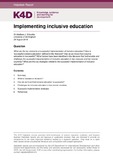Implementing Inclusive Education
Abstract
This rapid review synthesises evidence and literatures on the key elements of successful implementation of inclusive education. This includes a clear concept and definition of inclusive education. Second element is concrete inclusive education targets, indicators, measures, and outcomes. Third, an understanding of existing structural, educational, and cultural challenges to successful implementation. Fourth, a well-designed implementation strategy that includes a clear plan, evaluation, and school review process. Fifth, providing inclusive education training, sustained support, and resources for all teachers and school leaders. Final element is national leadership on inclusive education policy, education management information systems, curricular-reform, and coordinating social systems such as inclusive education and inclusive employment. In addition to this, this review also identifies that inclusive education is a continuous process of educational transformation, and a clear set of equity indicators – such as from UNESCO (2017) – can support inclusive education implementation. Measuring the success of inclusive education should go beyond merely counting students to evaluate access, but should include measures of educational quality, outcomes, and experiences. It also finds that the barriers to inclusive education are well-understood now, and include inadequacies in policy and legal support, resources and facilities, specialised staff, teacher training, pedagogical techniques, flexible curricula, supportive leadership, and cultural attitudes. However, current thinking suggests that it is perhaps more useful to think about ways in which existing successful inclusive education practices can be identified and scaled up, rather than focusing attention on deficiencies. In summary, key factors in inclusive education implementation include school and classroom level implementation such as school reviews and plans; training and supporting all teachers in inclusive practices, not just ‘specialised’ ones; and supporting school leadership to enact an inclusive vision for their schools. National-level implementation requires enabling policy to clearly articulate and support inclusive education; having strong systems to data collection and management; providing flexibility in curriculum; and coordinating with other aspects of society in which inclusive education factors, such as employment.
Citation
Schuelka, M.J. (2018). Implementing inclusive education. K4D Helpdesk Report. Brighton, UK: Institute of Development StudiesIs part of series
K4D Helpdesk Report;374Rights holder
© DFID - Crown copyright 2018.Collections
- Disability Inclusion – IDS Collection [74]
- K4D [937]

